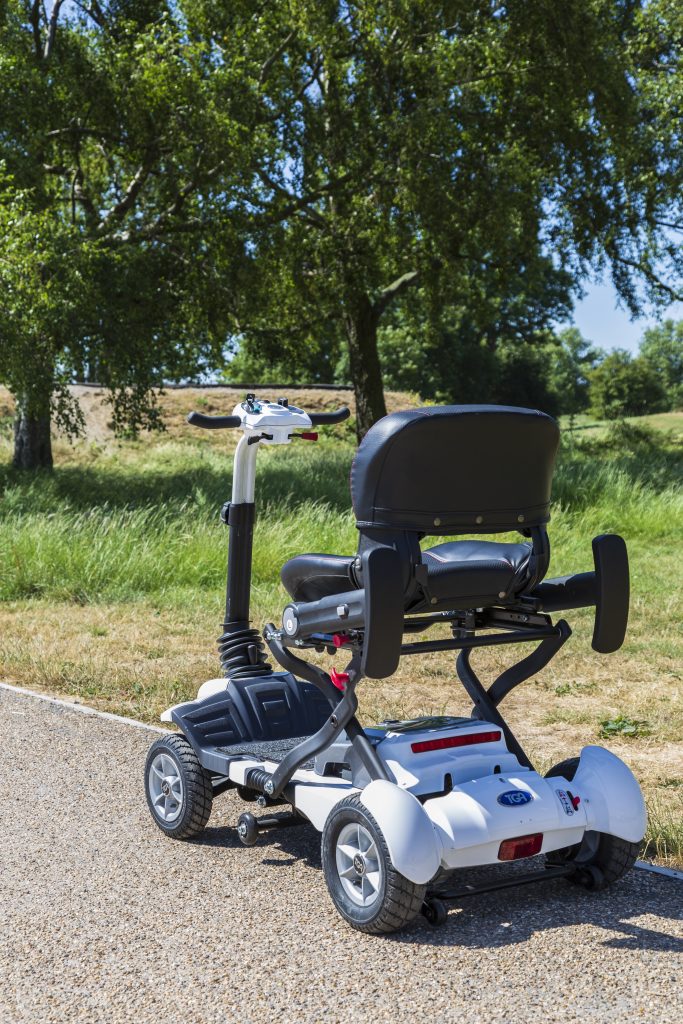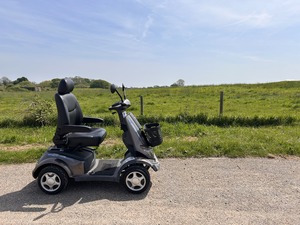Many mobility scooter owners will be in the habit of sticking your scooter on charge either overnight or as soon as you return from an outing in your scooter, but it’s always useful to know how long your mobility scooter will actually last.
Your mobility scooter likely gives you a great amount of independence for day-to-day activities. It can be a huge hassle, then, to go to switch on your scooter one morning only to discover your mobility scooter battery is completely flat!
In this guide, we’ll cover the different types of mobility scooter batteries, how long they last per charge, and how to extend your battery’s lifetime before replacing.
Types of Mobility Scooter Battery
There are three main types of mobility scooter batteries; AGM, gel cell, and li-ion. We’ve included a little extra detail about each one below. If you’re not sure what type of battery your mobility scooter has, check your manufacturer guide or contact the retailer you purchased your scooter from to check.
Sealed Lead Acid (also known as AGM)
This battery type is best for occasional users as it produces fewer cycles (meaning it needs to be replaced sooner than others). This does mean, however, that AGM batteries also tend to be the cheapest option of the three. These types of mobility scooter battery tend to come with a warranty of around 1 year.
Gel cell
Gel cell batteries are recommended for more regular users as it lasts much longer with more cycles. You’ll often see gel mobility batteries as the top recommended option – but it’s worth keeping in mind that the better quality also means a higher upfront cost.
Gel batteries are designed to perform well under varying weather conditions and tend to endure more charge cycles than some other types of batteries.
Lithium Ion (Li-Ion)
Lithium mobility scooter batteries are an extremely light-weight option (approximately 75% lighter than standard batteries!) that produces many cycles before it needs replacing. They are a great investment for people using their mobility scooter daily for independence, performing very well both in terms of distance and longevity.
Of course, the caveat is that this type of battery is much more expensive than the other two lead-acid battery options. However, a lithium battery is a great investment and there are certain things you can do to prolong the life of your battery and keep it at optimal performance.
Firstly, try to avoid depleting your battery fully as best you can, as they do not like this. Similarly, these batteries aren’t keen on being at 100% either. Being at a high or low state of battery level causes it ‘stress’ and may reduce its life span.
When storing your scooter, you need to be careful not to expose your scooter to extreme temperatures or moisture as these are also scenarios that may damage your battery’s lifespan. If you have any queries about storing your lithium scooter battery, you can contact your manufacturer or a local repair shop.
Mobility Scooter Battery Average Voltage
The majority of mobility scooter batteries are 12v, providing a total of 24v with two battery pairs in the scooter. When you replace your mobility scooter batteries, it is generally recommended that you change the pair together.
Gel cell and AGM batteries are both sealed, so need no maintenance. While AGM batteries are cheaper, Gell Cell batteries are more suitable for people who will be using their mobility scooter frequently.
If you have the budget Li-Ion batteries are a fantastic option, particularly if you are interested in a more lightweight design.
How Long Does The Average Mobility Scooter Last?
The majority of mobility scooter manufacturers will offer a 12-month warranty on your scooter batteries, but general speaking, the battery should last longer than this.
A mobility scooter battery typically has a lifespan of around 18 months, although this does depend heavily on how often you use it. For example, someone who uses their scooter multiple times a day can expect their battery to last for less time than someone who uses their scooter once a week or so.
How to Extend Your Mobility Scooter Battery’s Lifespan
Although the typical lifespan for mobility scooter batteries is from 12 – 18 months, you can ensure you get the most from your battery before needing to replace it.
Charging
Most mobility scooter manufacturers recommend charging your scooter overnight, and after each use. It’s always a good idea to check with your specific manufacturer, but the general rule of thumb is:
- Charge your scooter after every trip
- Charge overnight
- Avoid ever letting the battery to fully discharge
- If you haven’t used your scooter in a while, charge it at least once a month to avoid it going flat
Storage
Storing your scooter correctly can lengthen the lifespan of your battery. Ideally, you should store your scooter in a cool and dry place, preferably indoors, and fully charged, or on charge. Read more about how to safely store your mobility scooter.
Maintenance
It’s a good idea to take your mobility scooter to be serviced once a year. This way, you’ll know the condition your scooter is in and when you can realistically expect to need to replace your batteries, without any interruption to when or how you can use your scooter. This guide to Maintaining Your Mobility Scooter Year Round should give you some great pointers.
Avoid costly repairs and protect yourself from accidents with Surewise mobility scooter insurance, starting from just £3.80 per month.
Visit our mobility scooter insurance page to find out more about protecting your scooter from theft, breakdowns, and accidental damage when you’re out and about.








